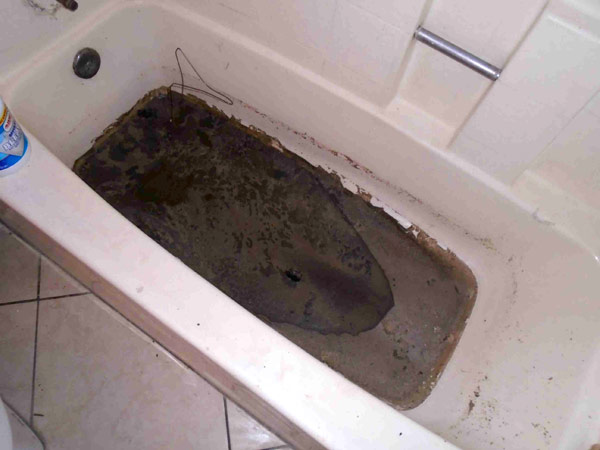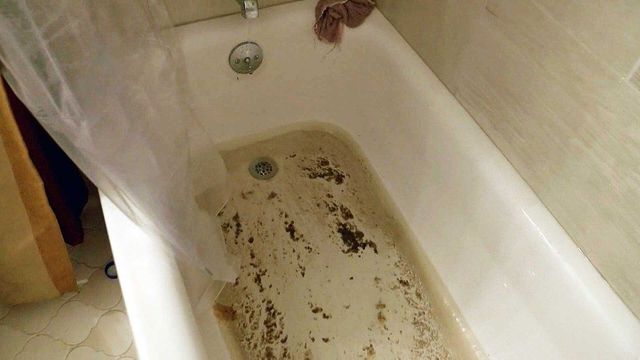The Definitive Explanation: Effluent Coming Up Through the Bathtub
The Definitive Explanation: Effluent Coming Up Through the Bathtub
Blog Article
Just how do you actually feel about Why sewage is coming up through your bathtub?

Sewage back-up in the tub can be a stressful and unsanitary trouble for any kind of home owner. Not only is it troublesome, however it also presents significant health and wellness dangers and suggests underlying problems with the plumbing system. Recognizing why sewage is showing up with the bathtub is critical for taking proper action to resolve the issue efficiently.
Intro to the Problem
Usual Reasons for Sewer Backup
Obstructions in the Sewer Line
Among the most typical sources of sewage back-up is an obstruction in the sewage system line. This can take place because of the accumulation of particles, oil, or foreign items in the pipelines, protecting against correct flow and causing sewer to back up right into your bathtub.
Tree Root Intrusion
Tree origins looking for dampness and nutrients can infiltrate sewage system lines via tiny cracks or joints. Over time, these roots can expand and increase, triggering significant damages to the pipelines and causing sewer back-up problems.
Recognizing the Problem
When sewer draws back up right into the tub, it's a clear indicator of an issue with the drain system. The wastewater that ought to be streaming far from your home is rather discovering its back right into your home, which can bring about substantial damage and carcinogen.
Potential Reasons
Several variables can add to sewer backup in the bathtub. From clogs in the sewage system line to concerns with the plumbing facilities, determining the source is vital for discovering a solution.
Aging Framework
Older homes might have outdated plumbing systems that are extra prone to rust, splits, and degeneration. As pipelines age, they become much more vulnerable to leakages and blockages, raising the chance of sewage back-up cases.
Heavy Rainfall or Flooding
Throughout periods of heavy rainfall or flooding, the drain system may end up being overwhelmed with excess water, causing back-ups and overflows. This can result in sewage backing up right into bathtubs and various other fixtures inside the home.
Signs of Sewer Back-up
Foul Odors
Undesirable smells emanating from drains or components, especially in the restroom, may indicate sewer backup issues. These smells are typically solid and relentless, indicating an issue that requires immediate interest.
Slow Draining Fixtures
Bathtubs, sinks, and toilets that drain slowly or not in any way could be experiencing sewage backup. If multiple fixtures are influenced at the same time, it's most likely that the problem stems from an usual point, such as the primary sewage system line.
Gurgling Sounds
Odd gurgling or bubbling noises originating from drains pipes when water is running somewhere else in the house are a measure of air entraped in the plumbing system. This air buildup can arise from sewage backup and should be examined quickly.
Health Dangers Connected With Sewer Backup
Contamination of Supply Of Water
Sewer back-up can infect the water in your house, posturing a significant wellness threat to you and your family members. Exposure to infected water can cause intestinal issues, skin infections, and various other health problems.
Mold Development
Dampness from sewer back-up can produce excellent conditions for mold and mildew growth in your home. Mold and mildew spores can aggravate respiratory troubles and cause allergies in delicate people, making timely clean-up important.
Spread of Illness
Sewage has damaging germs, viruses, and bloodsuckers that can create a series of illness, consisting of hepatitis, cholera, and gastroenteritis. Coming into contact with sewer or infected surface areas puts you at risk of infection.
Tidying up After Sewer Back-up
Disinfection Procedures
Thoroughly sanitize and sterilize affected locations after sewage back-up to remove hazardous germs and prevent mold growth. Usage proper cleaning products and protective gear to make sure safe and effective cleaning.
Reconstruction of Impacted Areas
Fix any type of damage to floor covering, walls, or fixtures brought on by sewer back-up. Depending upon the degree of the damages, you may require to replace carpets, drywall, or various other materials to recover your home to its pre-loss problem.
Immediate Actions to Take
Shutting Off Supply Of Water
In the event of sewer backup, it's important to switch off the water to stop more contamination and damages. Locate the main water shutoff valve in your home and closed it off up until the concern can be settled.
Contacting an Expert Plumber
Taking care of sewage back-up is not a do it yourself job. Get in touch with a certified plumber with experience in handling sewage-related concerns to evaluate the situation and perform required repairs or cleanings.
Avoiding Contact with Polluted Water
Until the sewage backup is settled, stay clear of contact with polluted water to avoid the spread of microorganisms and pathogens. Use protective equipment if you should be in the affected location and wash your hands completely afterward.
Preventive Measures
Regular Upkeep of Sewer Lines
Arrange routine evaluations and maintenance of your sewage system lines to determine and resolve prospective problems prior to they intensify right into major problems. This can include cleaning particles, evaluating for tree origin breach, and fixing any type of damaged pipes.
Mounting Backwater Shutoffs
Think about mounting bayou valves in your plumbing system to stop sewage from receding into your home during durations of heavy rainfall or flooding. These shutoffs instantly close when water starts backing up, safeguarding your residential or commercial property from contamination.
Proper Disposal of Household Waste
Prevent flushing anything besides toilet tissue and human waste down the toilet to stop clogs and blockages in the drain line. Dispose of oil, oil, and other house chemicals effectively to minimize the danger of plumbing issues.
Why is There Sewage Coming Up Through the Bathtub
Sewage in your bathtub is a major problem that can make you want to abandon the bathroom for good. You don’t have to. However, it is important to identify the source of the issue and take the necessary steps to resolve it in order to avoid any health risks and property damage. In this article, we will discuss what could be causing sewage to back up through your bathtub so you can take action quickly and effectively.
The Main Reason For Sewage Backup in The Bathtub
All the sinks and toilets in your home connect to different pipes that lead to the main sewer line. The sewer line then connects to the municipal sewer system. This connection works seamlessly on a daily basis, but there can sometimes be a problem with the main sewer line.
The most common cause of sewage backup is a clogged or blocked main sewer line. The main sewer line can be clogged due to the accumulation of debris, tree roots or grease buildup, or other materials. Another possible cause is a collapsed pipe. When this happens, your toilets and sinks won’t be able to drain properly. This is when sewage starts backing up through the bathtub. If the problem has been occurring for some time now, it might be time to consult with a plumber as there may be more severe damage that needs fixing.
How Can You Tell if it’s Coming From Your Sewer Line?
If you’re experiencing a sewage backup in your bathtub, then you can use a few simple methods to determine if it is coming from the main sewer line. First, try to unclog the tub drain with a plunger or an auger and see if that helps. If not, then inspect all of the drains in your house and check if there is any blockage in them. If some of the other drains are not working fine, then it’s likely the problem is with your main sewer line.
Common Signs of a Clogged Main Sewer Line
If you suspect that your main sewer line is blocked, then there are a few common signs to look out for. Frequent clogs in your home are a sure sign of a clogged sewer line. You can also check for slow drainage from all the plumbing fixtures.
Slow Drains
If you notice that it takes longer for your sinks and toilets to drain, then this could be a sign of a clogged main sewer line.
Frequent Clogs
Another common sign is that your drains or toilets become clogged almost all of the time. If this happens, then it could be a sign that the main sewer line is blocked.
Water Backup
Do you notice water or sewage coming back up from any of the drains in your home? If your answer is yes, you may have a clogged main sewer line.
Sinkholes
If you’ve noticed sinkholes in your yard or overflowing sewage from the ground, you may be facing a blocked sewer line issue.
Your Shower or Sink Makes Gurgling Noises
Have you noticed gurgling noises coming from your sink or shower lately? These are typically signs of a blocked sewer line and should be checked out immediately.
How to Prevent a Main Sewer Line Clog
Once you’ve identified that your main sewer line is clogged, it’s important to take steps to prevent it from happening again. The best way to do this is to avoid putting any solid material that can clog the drain, such as grease and other debris. You should also be mindful of what you flush down your toilet. In addition, you should schedule regular maintenance for your main sewer line. This will help keep it clear and free from clogs or backups.
What Should You do if You Notice Sewage Backing up Through The Bathtub?
If you’ve noticed sewage backing up through the bathtub, then it is important to call a professional plumber immediately. A plumber can inspect the situation and determine what the cause is, such as a blocked main sewer line. They will also be able to advise you on how best to fix the issue. In some cases, a simple drain cleaning may be all that is needed.
However, if the blockage is severe, then your plumber may need to use more advanced methods to clear the blockage.
No matter what, it is important to always call a professional plumber if you experience any kind of sewage backup. They will be able to assess the situation and provide you with a solution that is best for your home.
https://baylorinc.com/blog/why-is-there-sewage-coming-up-through-the-bathtub/

Do you really like reading about ? Try leaving a remark directly below. We'd be delighted to hear your opinion about this post. We are looking forward that you come back again before long. Remember to set aside a second to distribute this blog post if you appreciated it. Thank you for your time spent reading it.
Call Today
Report this page